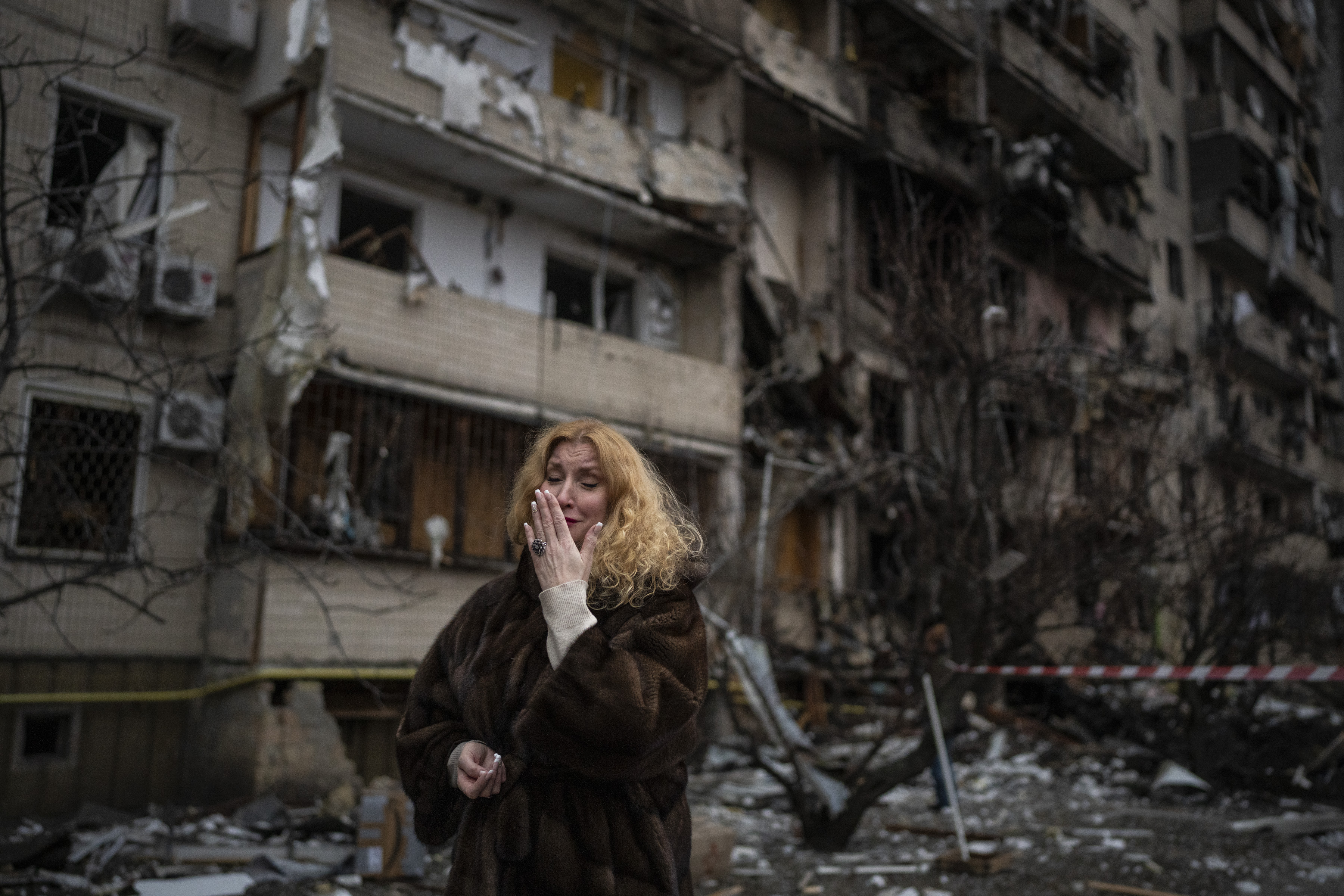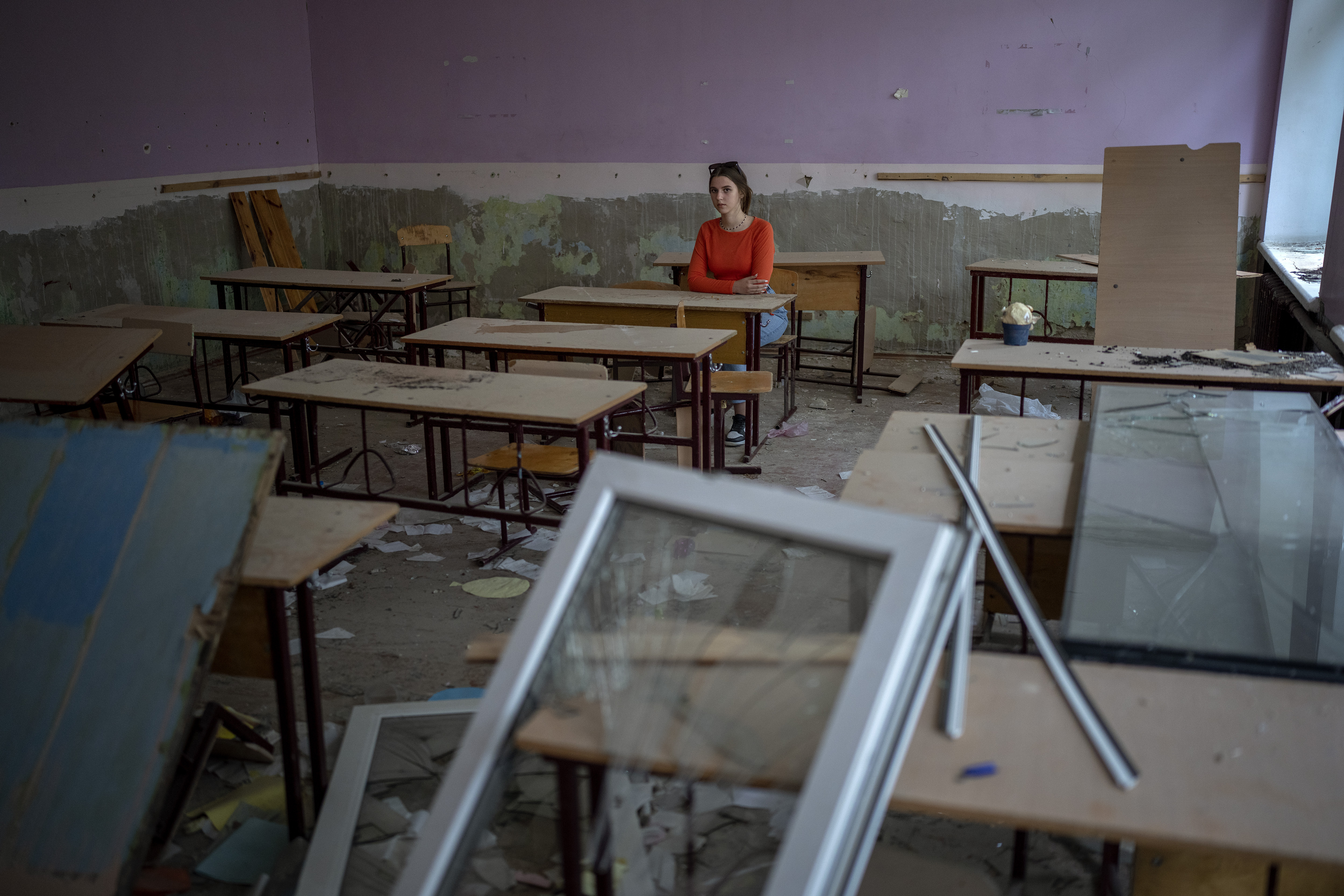
Sergei patiently waited in line until a supermarket opened in the city Severodonetsk. It was March 2022 and already many grocery stores were closed. As in other stores, the number of goods decreased, residents were forced to queue a few hours before opening. In such a queue that day was Sergei, the husband and father of a 13-year-old girl and a journalist by profession.
Half an hour before the opening of the supermarket already gathered 150 people. It was 8:30 am when he noticed a man taking pictures of a line of people from different angles. Some began to protest, but he did not intervene, thinking that it might be a fellow journalist. “But literally five to seven minutes after that, the bombing of this queue began. Then, a few tens of meters away, about three mines fell from there – it seems that they were mines. [που ήμασταν]. The line of people began to move closer to the house, to the wall, and when I already heard the whistle of this mine, I shouted: everyone down! I myself fell, covered my head with my hands and the next thing I remember is that I opened my eyes and there were pieces of asphalt on me.
A 35-year-old man witnessed 10 injured, three of them very seriously. He characteristically describes that a woman was so wounded that her internal organs were visible, and a man of about 50 was dismembered into four parts. Sergey is sure that there was not a single soldier among those standing in the ranks. “We started trying to call an ambulance, rescuers, anyone. But at this moment I realize that they blocked the linesbecause he wasn’t there [σσ. τηλεφωνική] connection. 10-15 minutes after the bombing, there was no communication, but people ran out of neighboring houses and […] they took some of the seriously injured to the hospital.”
The journalist realized that as soon as they left, the connection began to be restored and they managed to call an ambulance to the place. The next day, he learned that three had died in the bombing. He believes that among them was a woman whom he saw with a wound in the stomach. After this experience, he decides to leave the area.

300 Horrible Crime Stories
Sergey tells about all of the above a few months after the event, on August 4, 2022, to a Ukrainian journalist who he writes down his testimony word for word. She, along with 24 other colleagues, journalists and researchers highly qualified specialists for this work, have collected to date, in the context of the Reckoning project, about 300 testimonies that describe, respectively, heinous war crimes committed by Russians against citizens of Ukraine. The goal of the program is for readings to be recorded and documented in such a way that they can be used as war crimes cases in international courts.
OUR Janine DiGiovanniwith over 35 years of experience defending human rights in wars around the world, is the co-founder and CEO of this great initiative they are collaborating on. journalists and lawyers. “What we can do is speed up the administration of justice. One of the reasons I founded this project is the bitterness I saw in the former Yugoslavia and Rwanda about how long it took for the “bad guys” to be brought to justice, if they were ever brought to justice, then most of they were never held accountable. This is a way, while the war is going on, to collect evidence, check it and prepare case materials so that when the time comes and the trials begin, we can provide them and not wait. Our goal is to put an end to impunity,” he said in an interview with K.
It is this prospect that endures the journalists who record these testimonies – mothers who begged for the body of their dead child to be buried, volunteers who carried dismembered corpses, men repeatedly subjected to electric shocks in cold, dark cells. “That’s what gives us strength. The way we do journalism can help restore justice. If we were just writing tragic stories about war crimes, it would really be a heavy emotional burden. But it gives us a sense of perspective: what we are doing , can be used that a person’s history can be taken to court,” comments Natalia Gumenyukfounding member of the Reckoning Project and chief journalist.

Arrest warrant is a big win
For her, a very important moment came on March 17, when the International Criminal Court (ICC) issued an arrest warrant for Russian President Vladimir Putin, accusing him of committing war crimes in Ukraine.
“This is a big win. It signals that there will be trials,” he emphasizes during our conversation, which takes place via Zoom. As he notes, Russians still brag about their crimes as if there was never any way to punish them.. “The Russians boasted that they were taking the children away, which is why they were caught so early. They have Telegram channels where they brag about how many Ukrainian children they are adopting. […] I am sure that now if they decide to transport more children, they will do it more carefully, or not on such a scale, or they will not do it, because they do not want to leave more evidence, ”she says.
“It’s Order”
Having recorded many testimonies, she herself believes that the crimes committed during this wartime are not due to any particular platoon or some unruly soldiers, but due to a much larger and generalized phenomenon. “We see similarities between what happened in Bucha and Chernihiv — torture and how it was organized — with what happened in Kherson and Kharkov. Different times, different places, different Russian detachments from different parts of Russia. But it’s the same. This is the order. There is a certain way the armed forces work. This was not done by some bad units, Wagnerians or Chechens, the problem is with the entire Russian army. It is no coincidence that the soldiers do not have identification cards with them. It is clear that this army is sent to do something that it wants to hide in every place. This army exists to commit war crimes“, – the journalist notes.
She also adds that attacks on civilians in non-military areas, such as a train station or playground, are disproportionately high. “The concern is that somehow the bombing of civilians is becoming more bearable. Some say, “This is war.” But for me it is important that they are not tolerated. I believe that the extent of the violence is not yet really recognized by the world. War against civilians is part of this particular war“.
This scheme is well known to Ms. Di Giovanni, who has covered war crimes in the Balkans, Africa and the Middle East. “Vladimir Putin has an extensive list of how to punish civilians. He did it in Chechnya, in Aleppo, and now he does it in Ukraine. It’s like the more people resist, the harder it hits them.”
Source: Kathimerini
Anna White is a journalist at 247 News Reel, where she writes on world news and current events. She is known for her insightful analysis and compelling storytelling. Anna’s articles have been widely read and shared, earning her a reputation as a talented and respected journalist. She delivers in-depth and accurate understanding of the world’s most pressing issues.